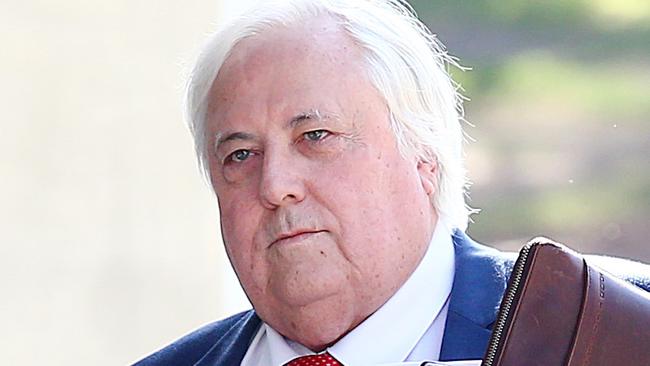Clive Palmer sprays ‘hopeless’ Bill Shorten and Labor’s ‘bad losers’
Clive Palmer has accused Labor of being ‘bad losers’ and attacked parliament’s joint standing committee on electoral matters.

Clive Palmer has accused Labor of being “bad losers” and attacked parliament’s joint standing committee on electoral matters over its “lack of credibility and objectivity”.
The Queensland billionaire, blamed by Labor for its election defeat on May 18, said “democracy means the party with most votes wins”. In a JSCEM submission dated November 18, Mr Palmer, who despite his multi-million-dollar ad spend failed to win a seat in parliament, lashed the committee over an “absurdly short timeframe” for submissions, which closed in September.
“The Labour Party (sic) received 22 per cent of the vote in the Senate election in Queensland, elected one senator. It is beyond belief that anyone could suggest that such a party could govern this democracy,” Mr Palmer said.
“Allowing submissions that personally attack an individual the way your committee does demonstrates its complete lack of credibility and objectivity.
“It easy for your committee, which has no members from our party, to make claims not supported by evidence and to consider irreverent (sic) issues.”
Ahead of public hearings for JSCEM’s inquiry into the May 18 election, Mr Palmer described Bill Shorten as a “hopeless candidate for prime minister” and said Labor had lost the election because it didn’t “get enough votes”.
“That is democracy. The material sent to me just indicates that the Labour Party and their supporters are bad losers and seek to blame the system for their inability to attract votes,” he said.
Criticising the committee, Mr Palmer said the “absurdly short timeframe in which to respond does not represent a ‘reasonable opportunity’ as referred to in the letter, but rather is insulting and an abuse of process”.
Mr Palmer used his submission to lash rival claims criticising the United Australia Party, describing them as “partisan political rants”.
“There is no evidence advanced or provided at all, particularly in relation to unfounded accusations of potential citizenship ineligibility towards candidates who had a democratic right to stand for election,” he said.
“The AEC (Australian Electoral Commission) had at the election tests to ensure only eligible people stood for election. All UAP candidates complied with those conditions. UAP candidates were eligible to stand for election.
“UAP candidates stood for election because they wanted to be elected to parliament and offer choice to the Australian people.
“There is no sworn evidence before your committee that any UAP candidates were not eligible to stand for election at the last election. Just unsustained allegations from people who do not accept shifty Shorten was a hopeless candidate for prime minister.”
Deputy Prime Minister Michael McCormack criticised the process for postal vote applications, “disenfranchising of postal voters” and pre-poll voting.
He said “slow delivery times and limited mail services in rural and regional areas proved to be a significant issue for those who applied for postal votes”.




To join the conversation, please log in. Don't have an account? Register
Join the conversation, you are commenting as Logout